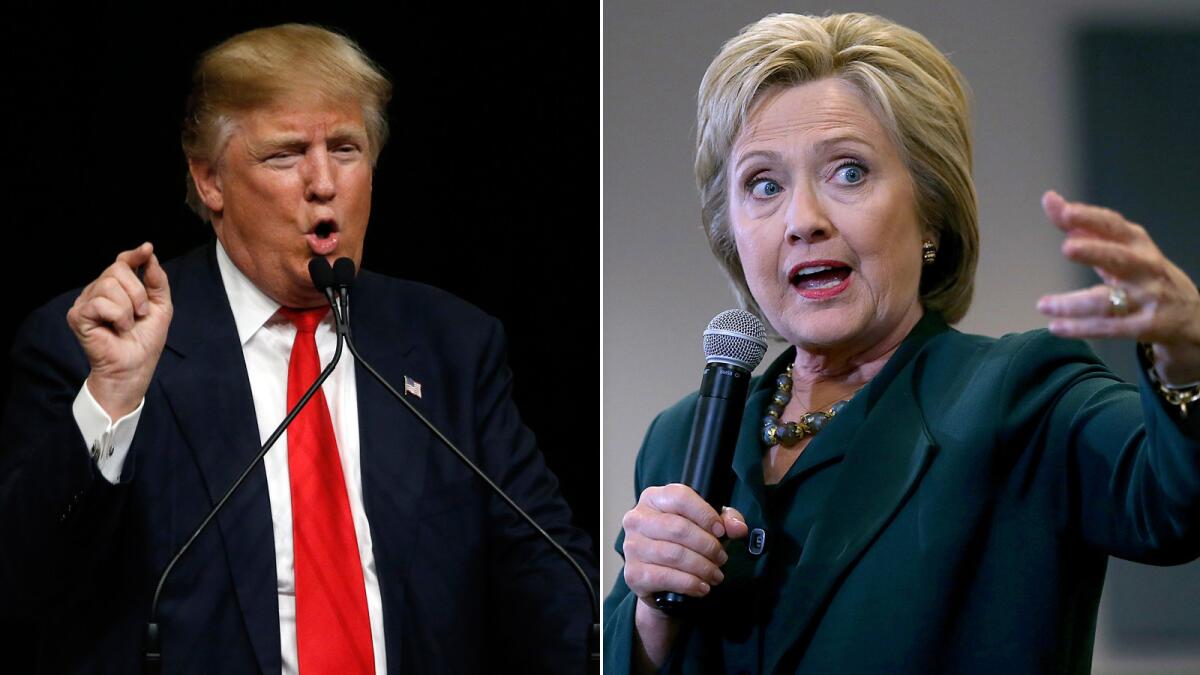A look behind how presidential debates are scheduled: Can they be rigged?

- Share via
In one of Donald Trump’s newest attacks on Democratic rival Hillary Clinton, he claims she’s "trying to rig” the televised presidential debate schedule.
Trump took to Twitter recently to protest the scheduled dates of the televised presidential debates this fall, accusing Clinton and the Democratic Party of manipulating the schedule to gain an advantage. In particular, he complained that two of the debates would conflict with NFL games.
The problem with Trump’s theory is that the debate schedule has been set for months. It’s determined by a nonpartisan committee that dictates everything from the date and location of a debate to who will moderate.
The Commission on Presidential Debates has sponsored every general election presidential debate since 1988. Though television networks will partner with party committees to broadcast primary campaign debates, general election debates are the commission’s domain.
The commission said in a statement that it started working more than 18 months ago to consider the best dates for presidential debates, taking into account religious holidays, federal holidays and sporting events. It said it had no plans to move the dates in light of Trump’s complaints.
The commission said conflicts were unavoidable.
“As a point of reference, in a four-year period, there are four general election debates (three presidential and one vice presidential) and approximately 1,000 NFL games,” the statement continued.
Here’s how the commission produces presidential debates:
Who gets to host?
The commission ultimately decides where debates are held, but different institutions can apply to be considered for selection. According to the commission, all but three of the debates it has organized have been held on college and university campuses.
This year’s debate schedule is as follows:
Sept. 26: Hofstra University — Hempstead, N.Y.
Oct. 4: Vice Presidential Debate at Longwood University — Farmville, Va.
Oct. 9: Washington University in St. Louis — St. Louis, Mo.
Oct. 19: University of Las Vegas, Nevada
The first debate this cycle was supposed to be hosted by Wright State University in Dayton, Ohio. The school later cited budget and security concerns for giving up the opportunity to host.
Complaints about the process
The commission has often faced criticism leading up to this election cycle’s debates.
In addition to Trump’s complaints about the timing, Green Party and Libertarian Party groups filed a lawsuit against the Federal Election Commission last summer. The parties, along with an advocacy group called Level the Playing Field, wanted the FEC to crack down on the commission. They said the commission’s standards violate FEC rules that dictate debates must be staged in a nonpartisan manner.
Another controversy involves the requirement for a candidate to participate in a debate. The commission’s 2016 rules mandate that a candidate must be polling at least 15% in an average of five national polls, using the most up-to-date polls from those five organizations.
The commission first adopted the 15% threshold in 2000. It states the threshold balances the need to be inclusive to popular candidates while preventing the inclusion of candidates with minimal support from “jeopardizing the voter education purposes of the debates.”
According to the lawsuit brought before the FEC, it would be impossible for a candidate who does not run as a Democrat or Republican to meet the commission’s 15% threshold. The suit states that it would cost a candidates about $270 million to achieve the name recognition needed to satisfy the 15% requirement.
What about the NFL?
The NFL, much like the Commission on Presidential Debates, likes to plan its schedule in advance. The league released its regular-season schedule in April.
The organization said it has no plans to change the dates of its games. It also said it did not send a letter to Trump — as Trump claimed — complaining about the debate conflicts.
Follow me: @Jill_Ornitz
ALSO
Clinton makes a lot of promises — which can she keep?
Which Republicans are supporting Trump, and who's jumping ship?
Trump tries to recover from blunders by sketching his economic agenda
Get the L.A. Times Politics newsletter
Deeply reported insights into legislation, politics and policy from Sacramento, Washington and beyond. In your inbox twice per week.
You may occasionally receive promotional content from the Los Angeles Times.







